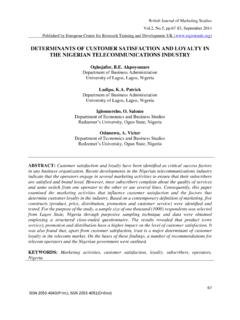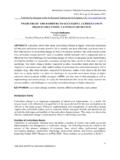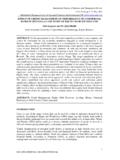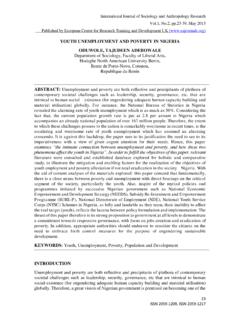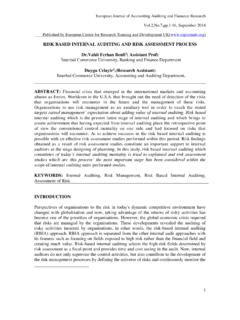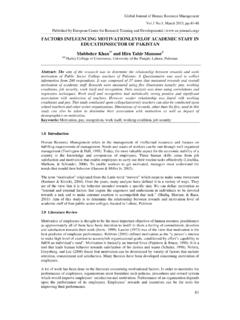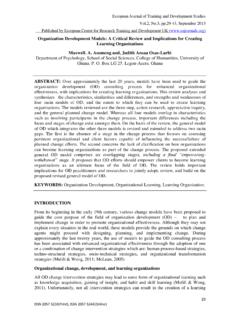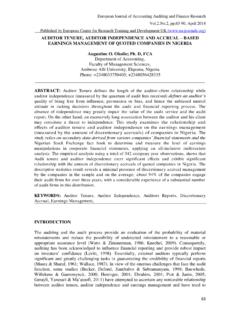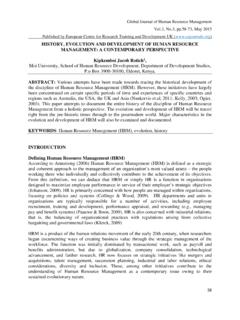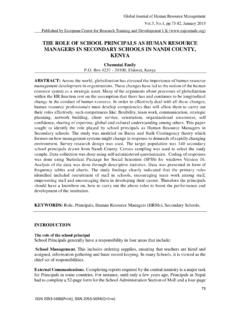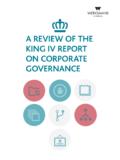Transcription of EXAMINING CORPORATE GOVERNANCE …
1 European Journal of Accounting Auditing and Finance Research , , , February 2015 Published by European Centre for Research Training and Development UK ( ) 10 ISSN 2053-4086(Print), ISSN 2053-4094(Online) EXAMINING CORPORATE GOVERNANCE PRACTICES IN NIGERIAN AND SOUTH AFRICAN FIRMS Adeoye Amuda Afolabi* National University Commission, PMB 237 Garki GPO Maitama Abuja, Nigeria ABSTRACT: This paper reviews the historical background of CORPORATE GOVERNANCE and emerging issues in the development and practice of CORPORATE GOVERNANCE in Nigerian and South African firms.
2 The paper examines the role of institutional bodies on CORPORATE GOVERNANCE of listed firms, regulatory and enforcement, and institutional bodies of CORPORATE GOVERNANCE in Nigeria and South Africa. Other issues also examined include role and responsibilities of CORPORATE board and external factors that affect CORPORATE GOVERNANCE such as politics, corruption, economic, and ownership structure of listed firms. We find that institutional shareholders are more active in South Africa than in Nigeria, also shareholders association in South Africa are not active compared with that of Nigeria.
3 In addition, South Africa have a stronger institutional framework than Nigeria, this really provide an evidence to show that enforcement of CORPORATE GOVERNANCE practices in South Africa seem to be better than Nigeria. Generally, we find that corruption and bribery, politics, economic and ownership structure influence effective CORPORATE GOVERNANCE practice in each country. KEYWORDS: CORPORATE GOVERNANCE , Institutional frameworks, Politics, Corruption, Economics and Ownership structure INTRODUCTION Since the 1970 s the issue of CORPORATE GOVERNANCE has been the subject of significant debate in the US and around the globe.
4 There are reforms of CORPORATE GOVERNANCE in developed and developing countries. Efforts to reform CORPORATE GOVERNANCE have been driven in part by the needs and desires of shareholders to exercise their rights of CORPORATE ownership and increase the value of their shares and wealth. Over the past three decades CORPORATE directors duties have expanded their traditional legal responsibility of duty of loyalty to CORPORATE organisations and shareholders, especially in developed countries. In the mid- 1990s the issue of CORPORATE GOVERNANCE in the US and UK received considerable press attention due to the wave of CORPORATE GOVERNANCE failure in some firms which led to a wave of institutional shareholder activism.
5 The East Asian financial crisis occurred as a way of ensuring that CORPORATE value would not be destroyed traditionally because of the relationship between the CEO and the board of directors such as unrestrained issuance of stock option not infrequently. In 1997 the East Asian financial crisis was seriously affected by the exit of foreign capital after the property assets collapse. This occurred as a result of lack of CORPORATE GOVERNANCE mechanisms this highlighted the weakness of the institution in their economies.
6 Finally in early 2000s the massive collapse of corporations such as Enron and WorldCom made shareholders and governments develop an interest in CORPORATE GOVERNANCE . This brought the passage of the Sabaness-Oxly Act of 2002(Sarbanes-Oxley Act 2002, World Bank 2002, OECD 1999). European Journal of Accounting Auditing and Finance Research , , , February 2015 Published by European Centre for Research Training and Development UK ( ) 11 ISSN 2053-4086(Print), ISSN 2053-4094(Online) Furthermore, international organisations such as the Organisation for Economic Cooperation and Development (OECD), and the Economic Commission for Africa (ECA) introduced principles of CORPORATE GOVERNANCE of firms.
7 The developed and developing countries introduced codes of CORPORATE GOVERNANCE to enhance the effectiveness of CORPORATE GOVERNANCE practices in firms. Consequently, the impact of CORPORATE GOVERNANCE has shown a positive effect on different stakeholders by strengthening the economy. Therefore, good CORPORATE GOVERNANCE is a tool for socio-economic development and this happened to developed countries such as the US and the UK. Moreover, the Securities Exchange Commission (2006) explained that in the Africa region despite the diversity of the 53 countries with different colonial legacies, some pattern can be discerned with regard to CORPORATE GOVERNANCE .
8 As a result, the need for CORPORATE GOVERNANCE among the listed, non-listed, and state-owned enterprises cannot be over-emphasised. Thus, it is obvious that CORPORATE GOVERNANCE can contribute to the economic success of firms and to long-term stability, which in turn will attract local and foreign investors. The Securities Exchange Commission (SEC, 2006) revealed that a survey conducted by Mckinsey consulting group in 2002, found that eight-five per cent of respondents consider CORPORATE GOVERNANCE in Sub-Saharan Africa to be more important than financial issues in deciding which companies to invest.
9 Consequently, this study extends its coverage to listed firms in Nigeria, and South Africa and these countries are English speaking countries and their selection is based on regional approach, this will give a wider scope. South Africa which is the strongest economy in the sub-region and Nigeria a having huge population and large markets, blessed with abundant natural resources such crude oil and land fertile for agriculture. The regulation, control and GOVERNANCE of Business Corporation of these countries are largely contained within provision of company legislation which have their root from British colonies which is their source of political independence.
10 Based on this, Nigerian and South African legal systems and CORPORATE GOVERNANCE mirror the United Kingdom pattern (Okike, 2007). Therefore, it is necessary for this study to examine the development CORPORATE of GOVERNANCE structures of listed firms for each of these countries in order to highlight different reforms, institution, politics, corruption, economic and ownership structure of firms in Nigeria and South Africa. Historical Background of CORPORATE GOVERNANCE in Nigerian and South Africa Firms Nigeria is one of the important countries in Sub-Saharan African Anglophone region because of his large size, huge population and markets for goods and services with abundant natural resources such as crude oil and fertile for agriculture.
